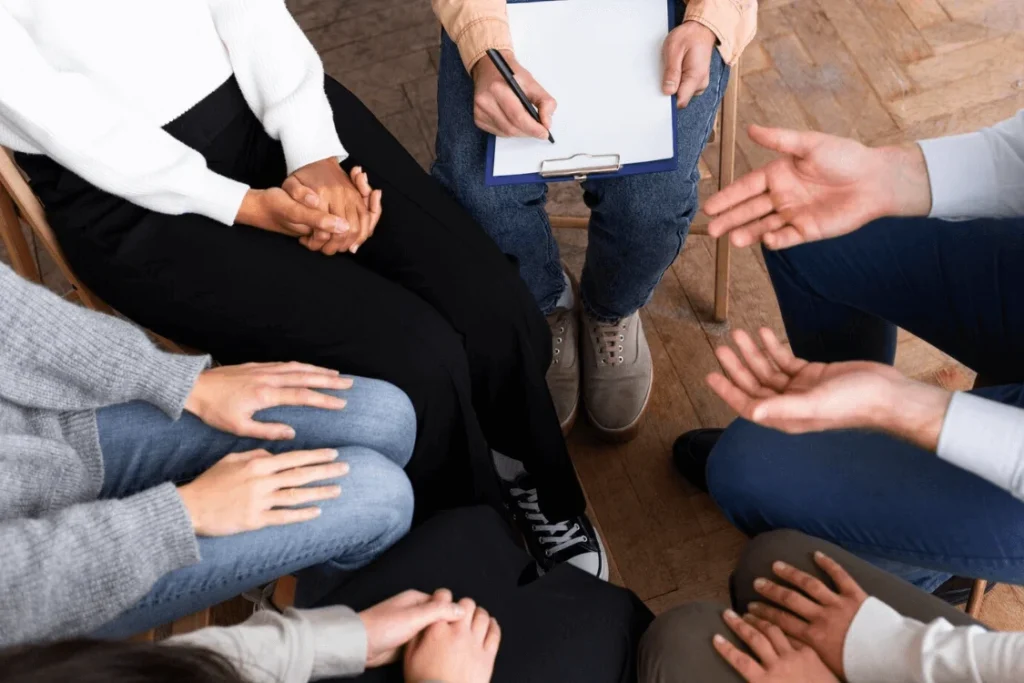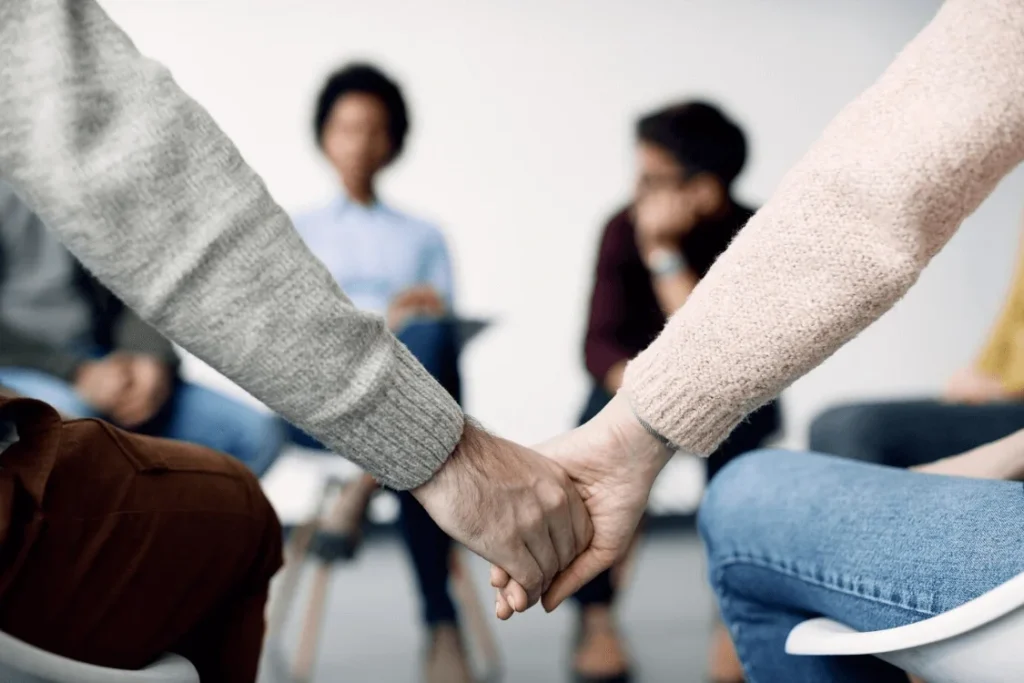
Group Therapy for Substance Abuse: Techniques and Benefits
Group therapy for substance abuse creates space for people to connect through shared experiences. In a setting guided by a therapist, participants talk openly, learn new skills, and support one another through challenges.
If you’re struggling with addiction, this kind of therapy helps reduce isolation and strengthens motivation for recovery. Being part of a group can bring insight, encouragement, and a sense of progress through each group session.
Understanding Group Therapy
Group therapy involves several individuals working together with a trained therapist to address substance use and related challenges. It encourages open discussion, peer support, and shared learning, typically creating a sense of connection that can strengthen motivation to change. Group therapies also promote accountability and emotional growth among group members.
How is it Different from Individual Therapy?
Unlike individual therapy, which focuses on one-on-one sessions, group therapy brings people together to share experiences and gain support from others facing similar issues.
It offers different perspectives, encourages interaction, and helps build social skills while still being guided by a professional therapist. This type of therapy is beneficial in addiction treatment, as shared recovery experiences help reinforce positive changes.
How Does Group Therapy for Substance Abuse Work?
In group therapy for substance abuse, you meet with others who are also working toward recovery. A trained therapist leads each group session and guides the conversation to keep it focused and helpful. You and the other group members take turns sharing experiences, listening, and offering feedback.
Sessions usually include practical discussions about triggers, relapse prevention, and emotional challenges. As you participate regularly, you begin to see how shared experiences can provide new insight and encouragement. The therapist ensures that the group remains safe and respectful so everyone can speak freely and stay engaged in the recovery journey.
In a meta-analysis of randomized controlled trials, individuals with substance use disorders who participated in group therapy showed significantly reduced substance use and improved psychological and social functioning compared to those in control conditions.
The review highlighted the group format’s ability to foster peer support, increase motivation, and teach practical coping skills. This supports the idea that group therapy promotes accountability, shared learning, connection, and long-term recovery momentum.

Benefits of Group Therapy for Addiction Treatment
Group therapy for addiction treatment offers consistent support through connection with others. It helps you build accountability, learn useful coping tools, reduce isolation, and stay motivated throughout your recovery process.
Develop Peer Support and Accountability
Group therapy allows you to connect with others who face similar challenges. As trust grows, you begin to rely on each other for support and honest feedback. This connection creates a sense of responsibility not just to yourself but to the group. Knowing others are invested in your progress can strengthen your commitment to recovery and keep you actively participating in group work.
Learn Coping Skills Through Shared Experiences
During group session discussions, you hear how others manage cravings, stress, or setbacks. These shared experiences can introduce new ways of thinking and coping. You may find that someone else’s strategy works for you, or you may refine your own through discussion.
Learning becomes practical because it’s grounded in real situations that mirror your own. These insights often become key parts of your treatment plan.
Break the Cycle of Isolation and Stigma
Substance use may lead to isolation, shame, and a belief that others won’t understand. In group therapy, those feelings begin to shift. Being surrounded by people who know what you’re going through helps reduce the sense of separation.
As you speak and listen, stigma loses its grip, and connection begins to grow. Support group settings can play a strong role in this change.
Gain Structure and Motivation in Recovery
Group sessions follow a regular schedule, which gives your week a dependable rhythm. This structure can help stabilize your daily routine. Hearing others talk about their progress and setbacks can also boost your motivation.
Seeing that change is possible, week after week, reminds you that you’re part of something consistent and forward-moving. This consistency is a key part of your treatment program.
Different Types of Group Therapy
Group therapy for substance abuse takes several forms, each offering a unique approach to support recovery and address specific treatment options.
Support Groups vs Clinical Group Therapy
Support groups are peer-led and offer a space where you can share experiences and encouragement without clinical oversight. In contrast, clinical group counseling is led by a licensed therapist and follows a structured approach. These sessions may include therapeutic techniques, guided discussions, and evidence-based interventions designed to support recovery goals. Both formats are commonly included in substance abuse treatment settings.
Skills-Based and Psychoeducational Groups
Skills-based groups focus on teaching you practical tools to manage cravings, handle stress, and prevent relapse. Psychoeducational groups provide information about addiction, mental health, and the effects of substance use.
Both types aim to give you the knowledge and techniques needed to improve coping and strengthen long-term recovery. These formats are widely used in treatment plans for substance use disorder.
Specialized Groups for Drug or Alcohol Addiction
Some group therapy sessions are tailored specifically to the substance involved. Whether you’re dealing with alcohol, opioids, stimulants, or other substances, these groups address the unique challenges associated with each type.
They provide targeted guidance, shared experiences, and specific relapse prevention strategies relevant to your situation. Group therapies like these are part of specialized addiction treatment programs.

What to Expect in a Group Therapy Session?
Group therapy sessions follow a clear process to support recovery. Understanding the structure and what happens during each session can help you prepare.
Structure of Group Therapy
Most group sessions begin with a brief check-in, where each member gives a quick update on their week or progress. The therapist may then introduce a topic or exercise related to recovery. You can expect open discussion, shared reflections, and time for each member to speak. Sessions often close with summaries or takeaways that reinforce learning and encourage reflection outside of the group.
Know the Role of the Group Leader
The group counseling leader is a trained therapist who guides the session and helps maintain a respectful and safe environment. Their role is to encourage discussion, manage group dynamics, and introduce therapeutic techniques. They may also ask focused questions or help you explore patterns in your thoughts or behaviors as they relate to substance use and recovery.
Common Group Therapy Techniques
Sessions may include techniques such as role-playing, cognitive restructuring, guided discussions, or mindfulness exercises. You might be asked to reflect on past situations, identify triggers, or practice new coping responses.
These approaches help you explore how thoughts, emotions, and behaviors connect, which gives you tools to apply in real life. These practices are central to many addiction treatment models.
Prepare for Group Participation
It helps to come with a willingness to listen and share at your comfort level. You don’t need to speak every time, but your input matters. Respecting others, keeping what’s said in the group confidential, and being open to feedback are key parts of the process. In the long run, your confidence in participating in group therapy often grows naturally.
Is Group Therapy Right For You?
Group therapy can be a helpful option if you’re open to sharing in a guided setting and interested in learning from others’ experiences. It may be a good fit when you benefit from peer support, want structure in your recovery, and are ready to explore how addiction affects your thoughts and behaviors.
If you find comfort in knowing others face similar struggles, or if isolation has been part of your substance use, this type of therapy may offer a strong sense of connection. A clinician can help you decide if group therapy aligns with your treatment plan and recovery journey.
Connect With Others and Begin Recovery
At Twilight Recovery, group therapy offers a setting where you can speak freely, listen closely, and be part of a shared recovery process. Each group session brings small steps forward, shaped by shared conversation and steady support.
We believe that there’s value in hearing others and being heard in return. Recovery builds over time, and being part of a group can support you in entering treatment and staying with it.
Frequently Asked Questions
What is the Main Goal of Group Therapy for Substance Abuse?
The main goal is to support recovery by encouraging shared learning, peer connection, and behavioral change through guided sessions led by a licensed therapist.
How Does Group Therapy Help in Addiction Recovery?
Group therapy helps by providing connection, reducing isolation, and allowing you to learn coping strategies through shared experiences with others facing similar challenges.
Can you Join Group Therapy if you’re Taking Medication for Addiction?
Yes, group therapy can complement medication. Both approaches can work together as part of a broader treatment plan recommended by your care team.
How often are Group Therapy Sessions Held?
Sessions are typically held once or twice a week, depending on the treatment program and your individual needs during recovery.
What Happens During a Typical Group Therapy Session?
Sessions involve check-ins, therapist-led discussions, peer feedback, and skill-building exercises focused on managing triggers, emotions, and progress in recovery.
Is Group Therapy Suitable for All Types of Addiction?
Yes, group therapy is used for various substance use disorders and is adapted to meet the specific needs related to each addiction type.

